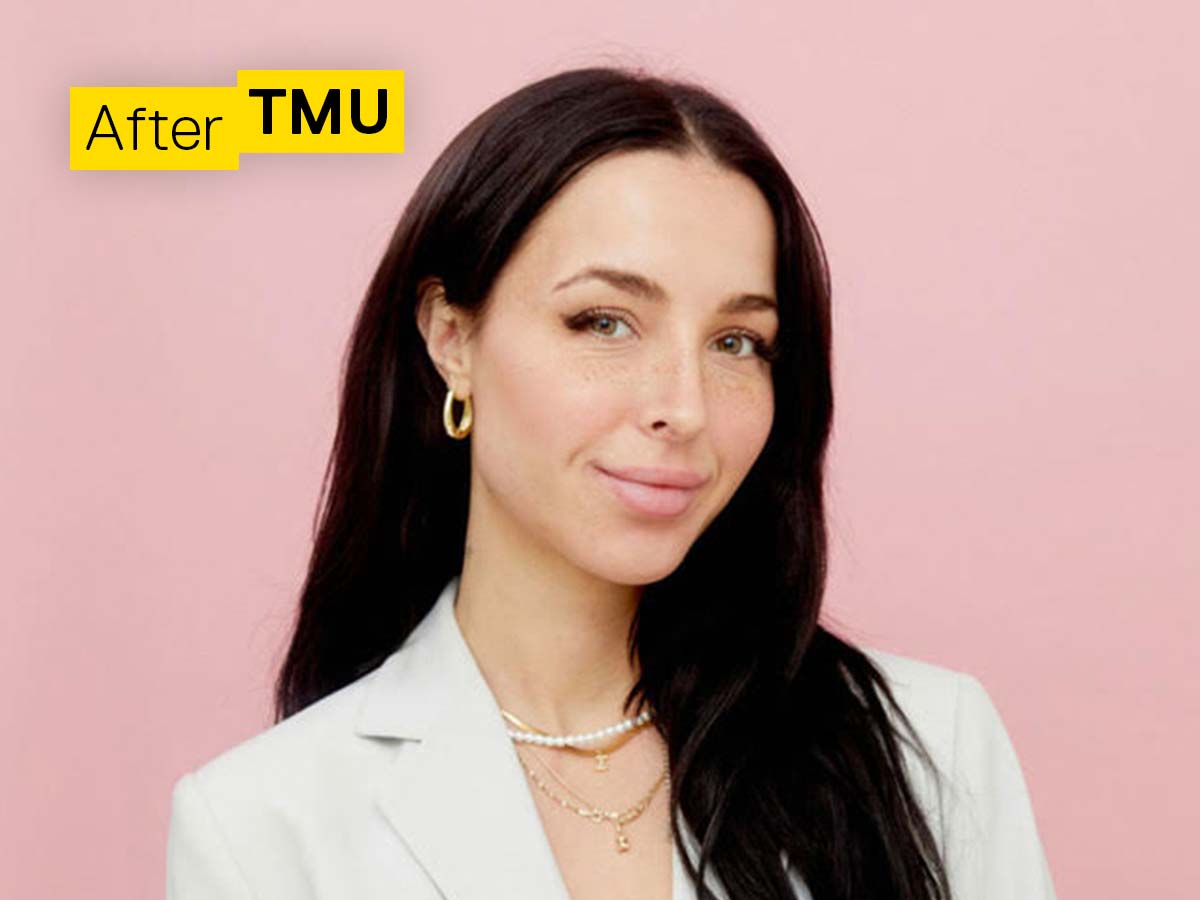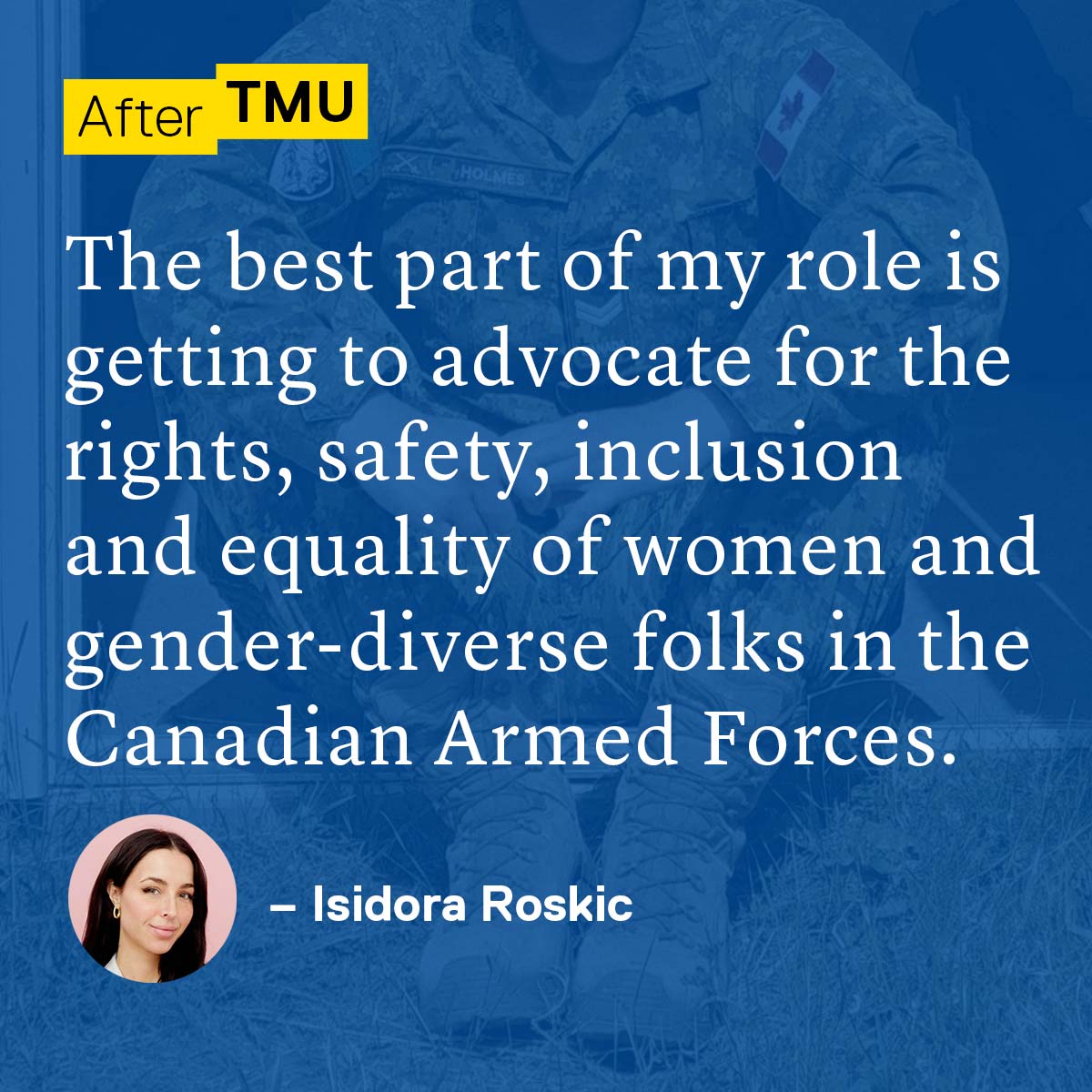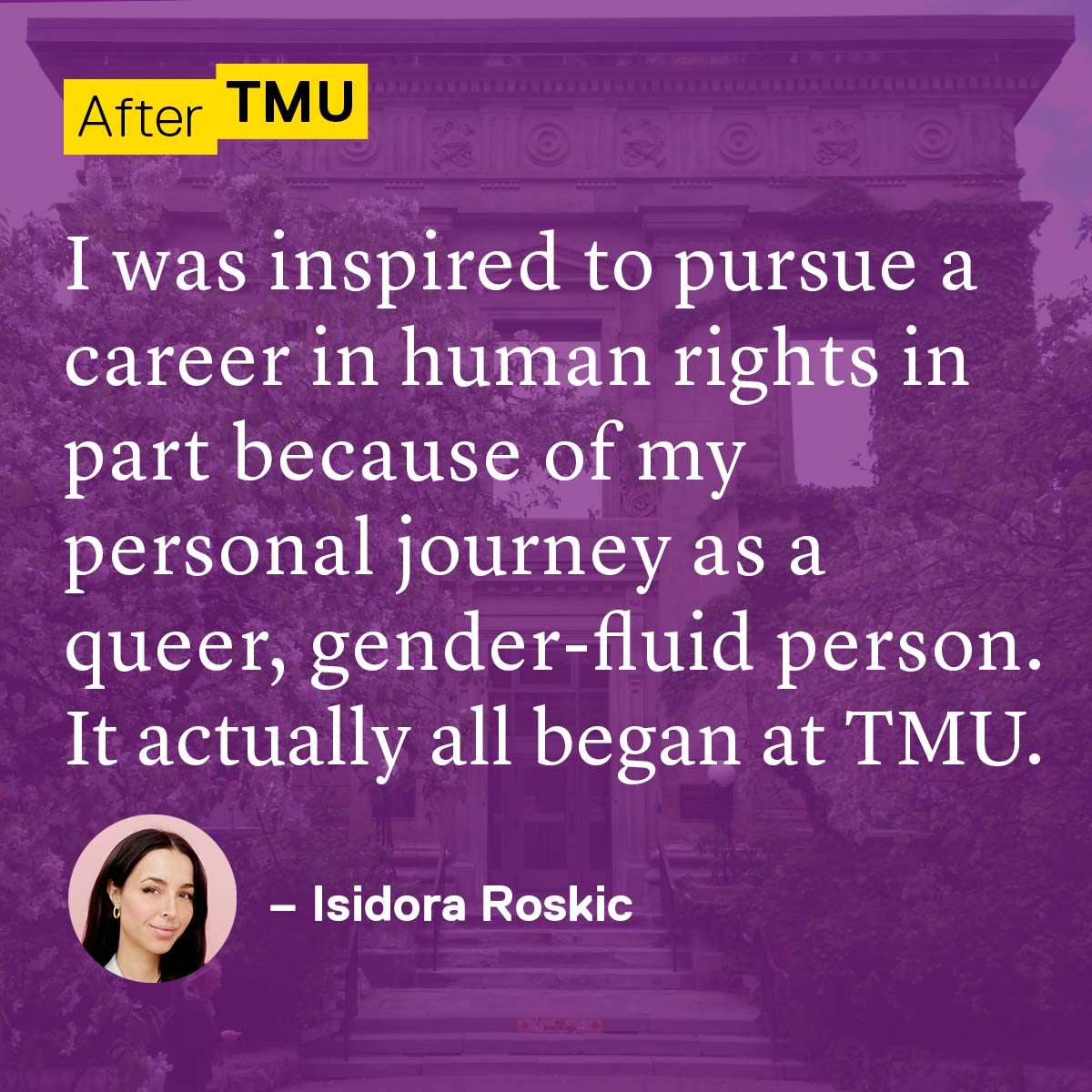After TMU - Isidora Roskic

Isidora Roskic
Creative Industries ’19
Policy Analyst, Department of National Defence
Why did you choose the Creative Industries program at TMU?
I chose the program because it intersected several different practical and creative areas of work. I think university students are faced with the unique challenge of choosing a focus of study before they’re ready to commit to a specific career. The Creative Industries program at TMU allowed the flexibility of exploring different knowledge areas — I was able to pursue a degree in Professional Communications and Media Business while also tapping into music, entrepreneurship and fashion.
What skills or experiences gained at TMU have helped you most in your career thus far?
I really benefited from the courses I took in marketing and professional communications because the skills are very transferable and relevant to any future degree and area of work. Specifically, I am appreciative of the opportunity to enhance my capacity to communicate effectively and persuasively, both orally and in writing. My favourite (and most daunting) class was in persuasive speaking. I was initially horrified at the thought of having to do a 5-minute improvised presentation in front of the class, but it taught me the importance of investing in my own self-confidence and of finding my voice.
What do you consider the best part of your job? What is the most challenging?
I presently work as a Policy Analyst for the Women, Peace and Security team at the Department of National Defence. The best part of my role is getting to advocate for the rights, safety, inclusion and equality of women and gender-diverse folks in the Canadian Armed Forces. I have had the privilege of advancing women’s rights and 2SLGBTQIA+ rights in the past but never in the context of the military. This is a brand-new area of work for me so I find it very exciting. In the same way, it is also the most challenging aspect of my work as there is a great learning curve to overcome. Nonetheless, I believe there is also value in coming into the space with little knowledge, as I can bring a unique, external perspective that has yet to be molded by years of experience in the industry.

What attributes/qualities do you feel are required to be successful in your field of work?
The specific attributes and qualities of a Policy Analyst will vary greatly depending on the industry and specific area of work. As a Human Rights Policy Analyst, it is invaluable to have strong:
- Communication and critical thinking skills
First and foremost, it is necessary to be able to communicate clearly and persuasively to a wide range of audiences. In my role, I frequently lead and support the development of new policy documents, research reports, briefs to deputy ministers, presentations to high-ranking officials, etc. I am also responsible for applying an intersectional lens to all communication and research outputs to ensure they are accounting for and inclusive of the experiences and needs of diverse groups of people. As such, it is invaluable to develop a keen ability to produce writing that is free of discrimination as well as to support others in developing their own expertise in this area. - Data collection and analysis
Policy analysts frequently rely on qualitative and quantitative data to evaluate the effectiveness of policies and identify gaps and possible areas of improvement. As such, it is important to be competent in collecting and interpreting large data sets and using data management tools (i.e., Excel). - Humility and empathy
In this area of work, you are commonly dealing with very difficult topics on a national or even international scale. You may even be interacting with victims of violence/discrimination. Therefore, it is essential to be able to conduct your work with maturity, cultural competency, patience, and in a trauma-informed way. This is an ongoing learning experience and requires us to challenge our own perceptions and internal biases.

Your career has had an interesting evolution. Can you tell us a bit about it?
I’m very fortunate to have had the opportunities that I did and to have gotten the chance to work with so many incredible organizations and activists. I was inspired to pursue a career in human rights in part because of my personal journey as a queer, gender-fluid person. It actually all began at TMU. I began volunteering, and later working, for the 2SLGBTQIA+ student centre in an attempt to establish my own support network after “coming out.” This eventually led me to working with other organizations in the area and inspiring me to pursue my masters degree in 2SLGBTQIA+ Human Rights at Columbia University.
I believe it’s natural to pivot your career path because our experiences and interests evolve as we grow. For some, it felt stressful to jump from an education and professional background in marketing to law and policy because I feared I didn’t have the skills or requirements necessary. My advice is to start by finding overlaps in skills and knowledge between your present schooling/work and your ideal next role. Next, take any opportunity to intersect yourself into the industry. I started off by joining boards, volunteering for non-profits, attending local networking events for people in politics.
What advice would you give to those looking to be more intentional in their career path?
- Hire a career coach to support and help prepare you for this transition. Mine completely revamped my resume and taught me how to better sell my experience during interviews.
- Find a mentor. Be more intentional during networking calls/events by identifying someone inspirational and directly asking them to mentor you. Follow up with this person to capitalize on their knowledge/advice.
- Don’t overlook the power of young professionals. At first, I only focused on connecting with senior professionals. Although it is great to establish relationships with industry leaders, I found that this takes a lot of time and effort as they are often very busy and their advice may not always be relevant to you (things could have changed a lot since they were in your position). I realized the power in connecting with my peers — it was much easier to connect with young professionals and they proved eager to invite me to their career events, introduce me to hiring managers and even give me a heads up for job postings.
How has volunteer work helped expand your professional experience, network and employment opportunities?
Volunteering was the foundation of my resume! I approached volunteering in two ways: (1) I volunteered for “big names.” This allowed me to expand my professional network and become affiliated with these organizations. The downside was that I didn’t always take on as much responsibility as I would like. On the other hand, (2) I volunteered for small, often understaffed non-profits because I got to quickly develop useful skills, establish meaningful relationships, and was often entrusted with real, valuable work. In several cases my volunteer work actually translated into paid roles afterwards. To this day I continue to volunteer, finding time to support local organizations outside of my 9-5.
What do you wish you could tell yourself as a first-year student?
If you’re feeling lost and need a “north star,” the easiest way to find it is to go back to the basics. Do some research and find a job that speaks to you and then ask yourself what industry (or industries) this job may reside in. Next, find a job posting or a professional working in the position on LinkedIn and work backwards — what skills, experience, education, professional background is needed? Use this as a basis for mapping out your own path and then get started. It’s important to go into it with the mindset that it is achievable. It may seem daunting to see a posting that requires “5 years of experience,” but remember that you can knock several of these years off through the course of your degree! More importantly, remind yourself that internships, volunteer work and co-ops go towards this professional experience. Meaningful work is still meaningful even if it isn’t being paid.